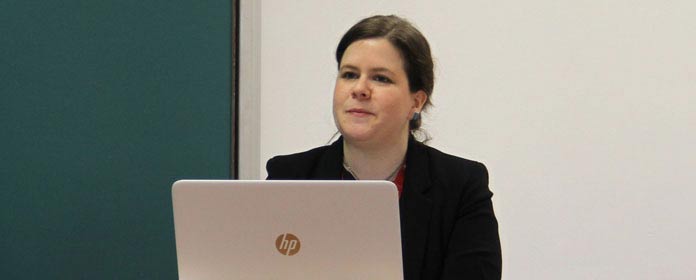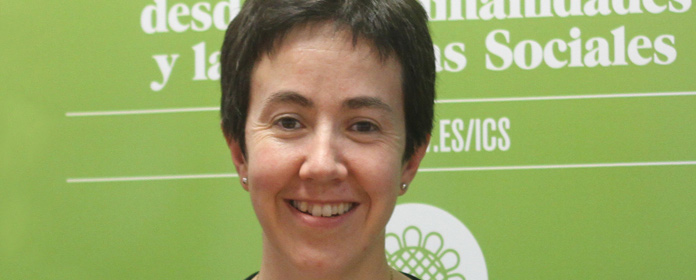The political speech during the coronavirus pandemic: connecting with the citizen to build trust and adherence to rules
Inés Olza, principal investigator of project MultiNeg at Institute for Culture and Society, is committed to moving away from war rhetoric and using figures that help motivate the population.

PHOTO: Isabel Solana
Inés Olza is principal investigator of the project MultiNeg of the Institute for Culture and Society (ICS) of the University of Navarra, within the framework of 'Emotional culture and identityand funded by the Ministry of Science, Innovation and Universities and FEDER/EU funds.
In this interview he discusses the political speech in the context of the coronavirus pandemic. Among other issues, he discusses strategies to build public confidence, motivate and gain adherence to norms such as containment.
One of the main objectives of the pandemic policy management is to generate trust and cohesion among citizens. What are the main strategies to achieve this emotional connection from the speech?
First of all, an institutional channel has to be established to inform citizens on a regular basis. It is necessary to combine the more institutional scenarios -the conference room of appearances at the Moncloa- with other more informal ones, such as the official profiles of the Government and the ministries in social networks. This combination must be very well coordinated. In terms of content, the audience needs to have the feeling that politicians are talking to them, that they are not just passing on content previously written on paper.
- And from the point of view of language?
We must appeal to solidarity and empathy, to the responsibility of each one, to how individual action is important for the collective. In the different speeches, many war and combat metaphors are being used; they should be avoided because they are violent and generate anxiety. Spatial metaphors and metonymies, for example, which are much more neutral and closer to reality, would help more and better to motivate the population. For example, instead of talking about "winning the battle against the virus", we could say that "our houses and cities will be free of viruses"; or, instead of "we must defeat the enemy together", we could choose "we must recover our health spaces together".
This proposal follows the line of research by Elena Semino of Lancaster University, who gave a seminar in 2018 on the extent to which the use of metaphors contributes to difficult experiences, such as cancer. In the case of coronavirus, there are also sufferers who are not going to get well, and they and their families may feel they have failed or lost out if their treatment does not work.
- What have been the most frequent expressions we have heard from political leaders? To what end have they been used?
They have spoken of discipline social, of collective thinking and effort, of solidarity? Implicit is something that is not often heard from the authorities: the general impact of individual action. This has to do with the idea of agency that is present in many sociological programs of study : who has the capacity or responsibility to do something. Governments often insist on the power of institutions, but in this case they know they need everyone's partnership . Right now the agency is shifted to the citizens. To some extent it is an exercise in humility on the part of politicians, who know that they must convince everyone to comply with their decrees.
- In your project MultiNeg you study disagreement in interaction. What conclusions can you offer from this research field? What are we observing in terms of consensus and dissent in the political sphere?
There is a very representative image: that of the President of the Government in the first week of the quarantine sitting in front of a screen with the autonomic presidents. After the meeting, a tweet underlined the broad consensus. The majority position is that this crisis does not understand political ideologies and that supporting the Government is an exercise of responsibility. There is also criticism, but more mitigated than what we usually see.
- How has people reacted to the signs of disagreement?
A very interesting phenomenon has been that of Clara Ponsatí, member of the Catalan National Assembly and MEP of Junts per Catalunya, who, in the first days of the alarm, tweeted 'From Madrid to heaven'. I had not seen such a unanimous response of rejection and condemnation in a long time. In a status in which everyone suspends disagreements and puts aside the agendas that confront us, that someone continues to insist on problems that right now are not the most urgent makes public condemnation multiply.
- Regarding the rejection of dissidents, it is also striking how the finger is pointed at citizens who are not complying with the confinement or who are not complying with the rules. Is it exemplary?
There is a constant social denunciation and the media are giving voice to the citizens. Journalists echo the most relevant cases, such as possible agglomerations. It is indeed exemplary because of the fear that we citizens have of social embarrassment and of making a fool of ourselves.
In contrast to this, we find the relevant positive stories about the great work of healthcare professionals. This is the case of news about symbolic acts such as the applause from the balconies.
- In the age of the Internet and globalization, we are saturated with messages. We are concerned about 'fake news' and information overload. How can we filter what is relevant?
We have to dose the amount of information we consume. We can't be continually aware of the networks and the news. Following the latest media information once or twice a day is enough. There comes a point when you already have the information you need, and the rest is just to repeat the same thing.




